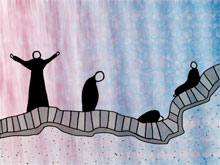The Importance of Mark’s Story
From the Orientation to Commentary by Tom Boomershine
Mark’s story of Jesus’ passion and resurrection may be the most important story in human history. The reason behind this statement is that this story and its interpretation has had so much impact for good and evil in subsequent history. On the positive side of the ledger, Mark’s narrative provided the model for the climax of the canonical Gospel tradition and was a source and an inspiration for the development of the Gospels. Mark and the other three Gospels in turn have been a source of redemptive experience of God in the lives of millions of people for the subsequent two millennia. It has been the most beloved story of countless numbers of persons. This story has truly been good news.
On the other side of the ledger, many people have heard this story as an accusation and condemnation of the Jews as “Christ killers.” Many pogroms against Jews during the Middle Ages were initiated by the reading of the passion narrative and specifically the Pilate trial on Good Friday. It was used as a foundation for the Nazi Holocaust. This story is therefore implicated in the deaths of millions of Jews over the centuries. We need to look this potential meaning of the story square in the face and ask: Is anti-Jewish polemic an accurate perception of this story’s original meaning and impact?
The conclusion explored in this commentary is that the central meaning of Mark’s story in its original context was that Jesus’ death and resurrection was a sign that he was a non-violent Messiah of peace whose life and death was a witness to the transformative power of the love of the “other” and a revelation of God’s way of redemption. The sympathetic hearing of this story is an invitation to reflect on our perpetual choice as a human community of the warrior and warfare as the way by which we will be delivered from the powers of evil and violence. It is also a proclamation that humanity can be saved from delight in violence and can learn Jesus’ way of love, non-retaliation, non-violent resistance, and forgiveness. If this story can reveal the way that will lead to global peace, it will be the most important story in human history.
Story as a Way of Knowing
In Story as a Way of Knowing Kevin M. Bradt, S.J. discusses the epistemology of “storying” ways of knowing, as opposed to writing/print ways of knowing. Bradt places so much emphasis on the importance of audience that he decided not to use “storytelling” to describe the event because, using the stool metaphor, it would be lopsided and thus unusable. He says that storying “exists as an interpersonal transaction within a relationship that is constantly being reconfigured, changed, and recontextualized by the exchange of the ‘story-spoken’ and the ‘story-heard,’ the meaning meant and the meaning interpreted.”
Bradt’s ideas flow from the work of Walter Ong with a presentation that is more accessible. GoTell recommends this book as an important resource for anyone delving into the theory undergirding biblical storytelling.
2014 Festival Gathering
Network of Biblical Storytellers
The keynote speaker this year is noted Christian educator Vicki Garvey from the Episcopal Diocese of Chicago. Her theme is “Teaching the Story in a New Era.” In addition to hearing this fabulous “of the moment” Christian Educator, you can also rub shoulders with some of the best biblical scholars in the world, enjoy hands-on workshops for every level of storyteller from beginner to master, experience deep-well worship, hear an epic telling of the Gospel of Matthew, and enjoy the best fellowship you’ll ever find at a conference. CEU Credits are available. The Festival Gathering is August 6-9 at Ridgecrest Conference Center just east of Asheville, NC. Click here for more info and to register.


